
Mission #310, 14th April 1945. 'Pops' only 'credited' combat mission, on B-17G 44-8401. Photo courtesy of www.384thbombgroup.com
.jpg)
Lt.Col. William 'Pop' Dolan, Briefing Room (Technical Site). Photo courtesy of www.384thbombgroup.com

Lt. Colnel William 'Pop' Dolan (back row, 2nd from right). Photo courtesy of www.384thbombgroup.com
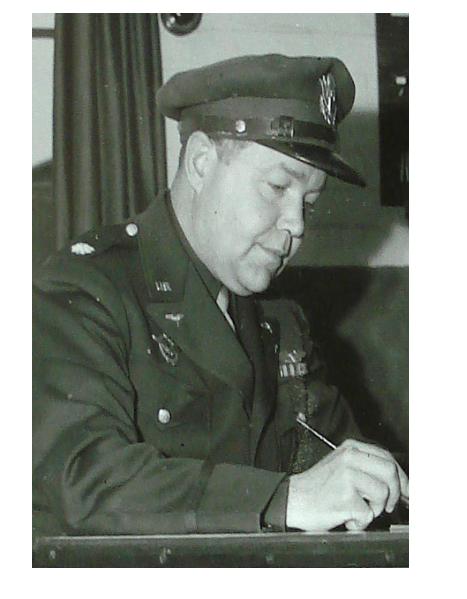
Lt. Col. William 'Pop' Dolan. Photo courtesy of www.384thbombgroup.com
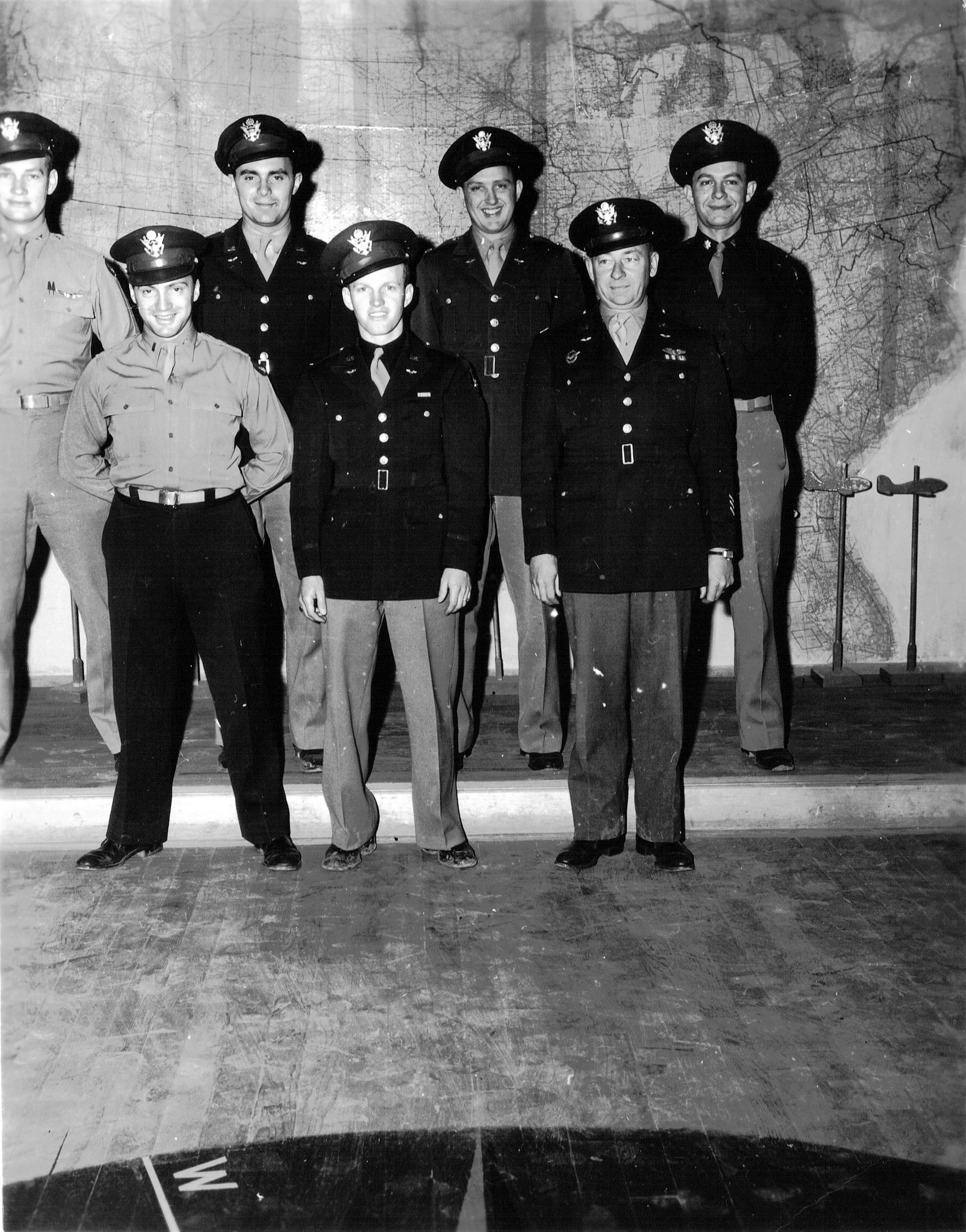
Lt. Col. William 'Pop' Dolan (front, far right). Photo courtesy of www.384thbombgroup.com
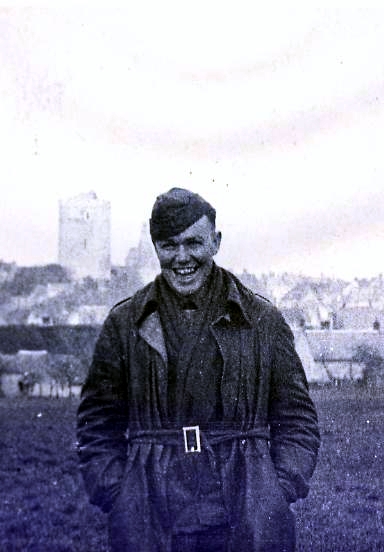
William 'Pop' Dolan, photograph from WW1 service. Photo courtesy of www.384thbombgroup.com
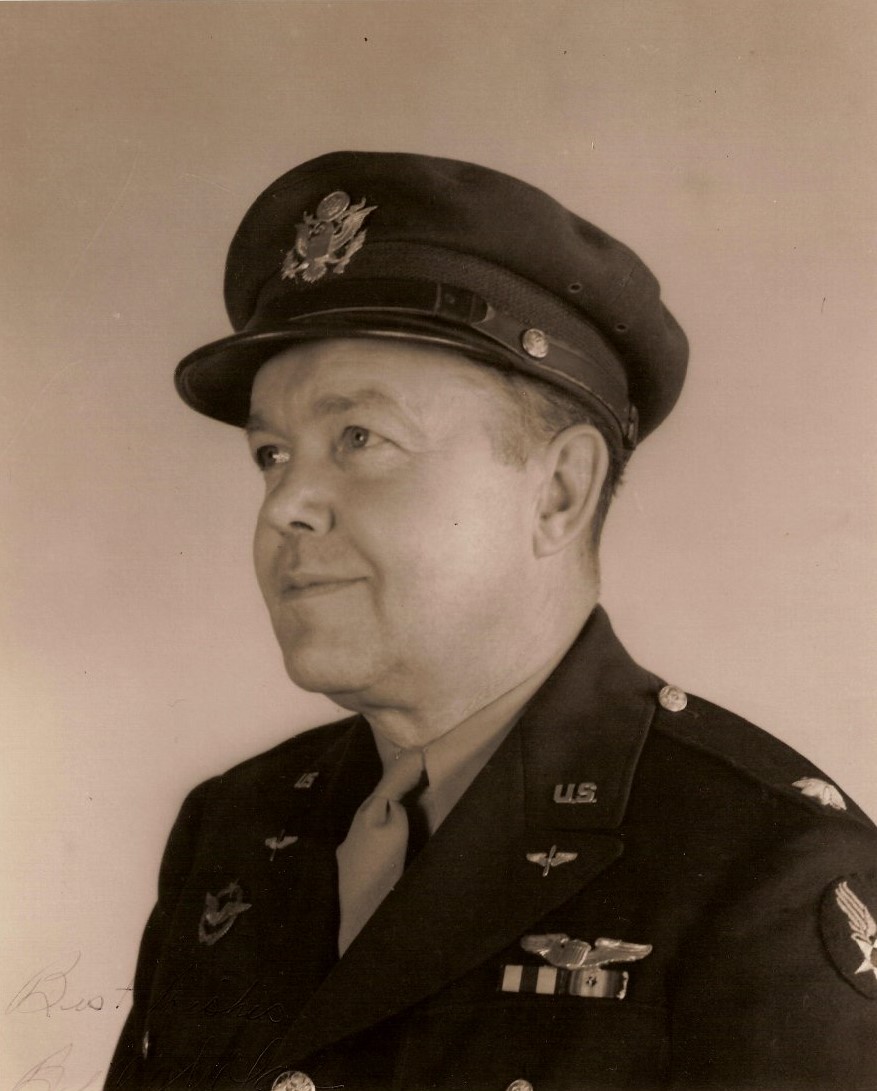
Lt. Colonel William 'Pop' Dolan. Photo courtesy of www.384thbombgroup.com
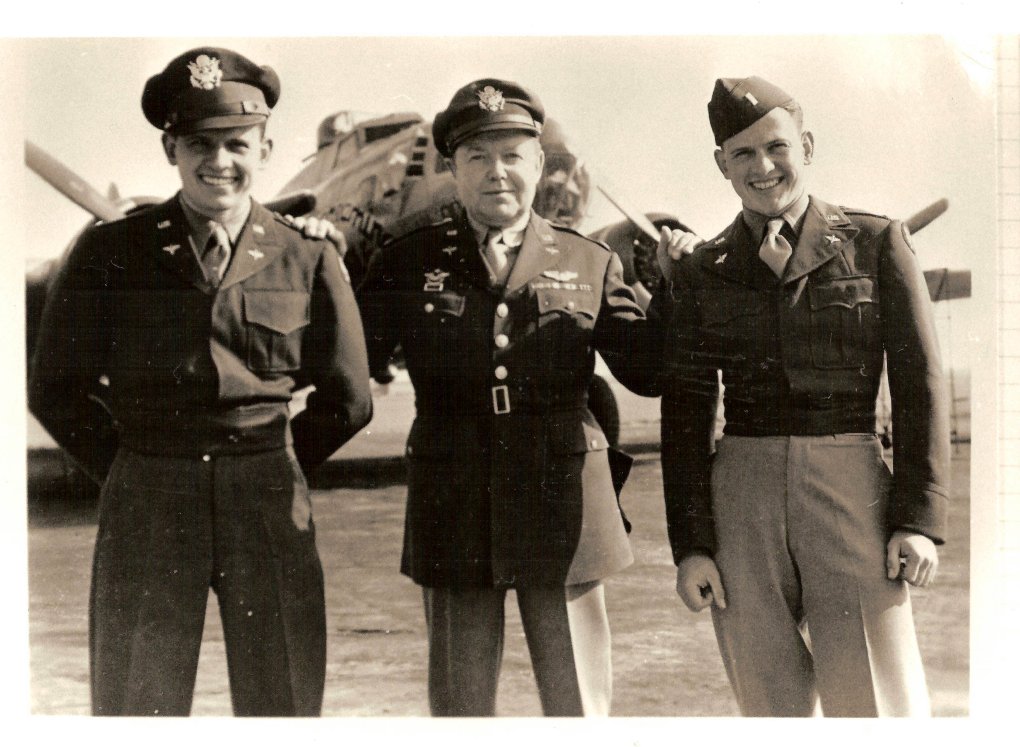
Lt. Col. William 'Pop' Dolan, with stepsons Harry and Ed, in front of B-17G "Screamin' Eagle". Photo courtesy of www.384thbombgroup.com
The Story of William "Pop" Dolan
Last updated: June 5, 2025, 3:24 pmLieutenant Colonel
William E. "Pop" Dolan
Group Intelligence Officer
2nd Jan. 1943 - 6th Sept. 1945
384th Bombardment Group (Heavy)
Serial Nr O-468972
Missions credited 384th BG - 1
Served under all 384th BG Commanders in his role as Group Intelligence Officer, and was the only Staff Officer to serve the 384th continuously from its inception through to deactivation.
Pop was born in Boonton, New Jersey on 4th July 1896, the second of three boys and grandson to Irish immigrants. He served as a Squadron First Sergeant and later as a pilot in the Aero (Aviation) Branch of the US Army, during WW1. He received his flying wings at Issoudin, France and was to proudly wear them for the rest of his life.
In 1926 Pop married Mary Elizabeth (Beth) Van Tassel, settling in Ridgewood, New Jersey. They had four sons between them, two of whom were stepsons from Mary's first marriage, all of whom served in the Army Corps and USAAF during & after WW2. There is a photograph in this section of Pop with the two stepsons, Harry and Ed, seemingly taken at Grafton Underwood in front of B17 "Screamin' Eagle".
Pop was assigned to the 384th from its formation to commence training at Wendover, Utah in 1943, alongside Budd Peaslee. He served the unit continuously throughout WW2, until September 1945. His role entailed collating and sharing all intelligence required for mission planning. Pop's age compared to the majority of the 384th personnel at Grafton Underwood led to his nickname, which eventually stuck.
The first echelons of ground personnel were to arrive into the UK on Queen Mary on 2nd June 1943, docking in Greenock, Scotland. They were then to travel by train to the station at Cranford, Northamptonshire which is a short distance from Grafton Underwood airfield. Arriving into the station at 8.30pm on Thursday 3rd June 1943, it is documented that Pop was amongst the welcoming party, having been part of a small advanced party that had already set up at the airfield - there is no record currently found of when this would have been.
Although his important role determined he was ground based, it is know he was an 'observer' on a mission on 14th April 1945 to Royan, France. He flew on B-17G #44-8401 of the 544th Bomb Squadron. The target was a gun battery in an isolated pocket of German resistance overlooking the port of Bordeaux. However, there is also mention of a total of nine missions being flown, which is partially substantiated by two seperate crew images with Pop clearly in flying clothes on each. In an article, Budd Peaslee spoke of Pop requesting to go on one of the early bombing missions during 1943 - this was flatly refused as Budd held Pop in such high esteem that he could not risk losing his influence in and around the airfield.
Pop is detailed as covering Catholic Chaplain duties in the interim between units arriving at the airfield, and the appointment of the Roman Catholic Chaplain Father Method Billy 0n 23rd August 1943. The Protestant Chaplain Robert Dayle Schnelle was already with the Group, however it would appear that Pop actively took it upon himself to provide for the needs of the Catholic personnel in this period. Indeed Father Billy Method was to later speak highly of Pop's work in this time, and also his efforts to secure him a private Confession Room soon after arriving at the airfield.
After wars end, it is recorded that Pop was to spend around a month in Le Havre, France helping to document and process 384th Prisoner of War personnel. He was one of the last people at Grafton Underwood airfield helping to oversee the decommissioning of the airfield and the removal/disposal of equipment and other materials. He was then to move to Istres, with the rest of the Group.
One of Pops achievements whilst with the 384th in the UK was the production of 'Plane News', a newspaper-style production for the 384th detailing latest news, achievements and comings and goings of staff. It was intended as a morale booster for the group and several editions were printed - it is recorded that the printing presses of the Kettering Evening Telegraph (a local newspaper) were utilised for production. It is later stated that the proceeds from sales had gone towards the purchase of instruments for the Station Orchestra.
In later years, Pop was instrumental in attending and helping to arrange Reunions of the 384th Bomb Group, and was to make several visits back to Grafton Underwood until his passing in 1986.
In the course of his duties, Pop was awarded the Bronze Star, and Legion of Merit for his service as Intelligence Officer.
Research courtesy of Kathy & Bill Lev on behalf of 384th Bombardment Group Museum. Additional information by Keith Andrews on behalf of the 384th Bombardment Group Museum.
With kind thanks to the 384th Bomb Group website (384thbombgroup.com) for permission in using material from their records in the making of this story. It holds a wealth of information, documents and photographs of their activities during World War 2.
Gallery

Mission #310, 14th April 1945. 'Pops' only 'credited' combat mission, on B-17G 44-8401. Photo courtesy of www.384thbombgroup.com
.jpg)
Lt.Col. William 'Pop' Dolan, Briefing Room (Technical Site). Photo courtesy of www.384thbombgroup.com

Lt. Colnel William 'Pop' Dolan (back row, 2nd from right). Photo courtesy of www.384thbombgroup.com

Lt. Col. William 'Pop' Dolan. Photo courtesy of www.384thbombgroup.com

Lt. Col. William 'Pop' Dolan (front, far right). Photo courtesy of www.384thbombgroup.com

William 'Pop' Dolan, photograph from WW1 service. Photo courtesy of www.384thbombgroup.com

Lt. Colonel William 'Pop' Dolan. Photo courtesy of www.384thbombgroup.com

Lt. Col. William 'Pop' Dolan, with stepsons Harry and Ed, in front of B-17G "Screamin' Eagle". Photo courtesy of www.384thbombgroup.com